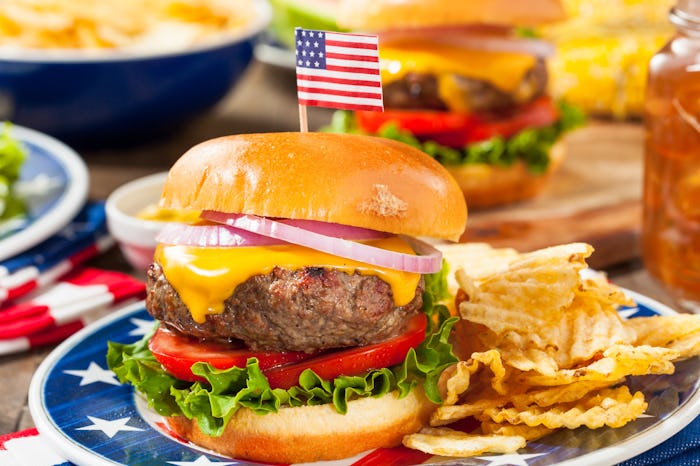Life

Can You Eat BBQ While Pregnant?
Summer has the best food. The tomatoes are juicy and ripe, the corn is fresh and delectable, and you can cook outside every day if you want. You'll also probably be headed to a lot of backyard barbecues. But, is it safe to eat barbecue while pregnant?
In the south, the word barbecue means one thing: slow smoked meat products that may or may not be doused in an aromatic sauce. For the rest of us, especially where I'm from in the midwest, a barbecue — or cookout — is a backyard party full of all kinds of food, fun, and likely at least one salad that contains absolutely no fruits or vegetables, but at least three types of marshmallows and cream products. (It's a salad if I say it's a salad. Even if it has sliced Snickers bars and cream cheese.)
Not all of the food is created equal, though, and some foods are definitely safer than others. You already know that if you're pregnant, you have to skip Uncle Jim's "party punch" and it's the perfect excuse to avoid having to choke down a few crackers smeared in Aunt Barb's hatch chili and pineapple ham salad with dijon mustard. "Sorry, Aunt Barb, Junior here just can't do meat spreads." How do you know what's safe and what isn't? I researched all of the latest guidelines for you, and came up with a handy-dandy list.
Smoked & Grilled Meats
This is the trickiest of all of the items on this list. First, the Centers for Disease Control and Prevention (CDC) guidelines allow smoked meat during pregnancy, provided that it's heated above 160 degrees Fahrenheit (145 degrees Fahrenheit for fish). However, recent studies published in the Journal of Nutrition cautioned against eating smoked and grilled meat due to the effects of the airborne polycyclic aromatic hydrocarbons (PAHs) that are created in the smoking process. These PAHs are shown to contribute to lower birth weight and head circumference in newborn babies who were exposed to them prenatally. Yes, this includes bacon. I'm sorry. I feel terrible.
All Those Salads
I'm originally from the Midwest. If there's a way to add mayonnaise or sour cream to any vegetable or fruit and call it a salad, we will. Egg salad, potato salad, jello salad, macaroni salad, chicken salad — they're all delicious and they all have either mayo, cream, or both. According to the USDA, these foods that contain eggs or creams must remain refrigerated or over ice, covered and served immediately to be considered completely safe. If they're neither, they must not be out of the fridge for more than two hours, or one hour if the temperature is more than 90 degrees Fahrenheit outside. If you don't know the ingredients or how long it's been out, skip it.
Fruits & Veggies
According to the Food and Drug Administration (FDA), fruits and vegetables, even cooked vegetables, are fine at a barbecue. However, if they're covered in cream or grilled, you may want to avoid them for the reasons listed above. Fruits and veggies must be thoroughly washed and handled with care as to prevent any possible cross-contamination of bacteria from entering the fruit, too. So don't use the tongs you're using on the hot dogs on the pineapple slices, and you should be fine.
Sprouts
They're a popular salad topping, and often shoved on top of a burger with some avocado to be coined a "California burger." (At least in the diners here in New York City.) However, according to the CDC, raw sprouts are a no-no. They may contain salmonella or E. coli, and those are difficult to treat in the pregnant population, so it's best to avoid them.
Ice Cream
Not so fast, baby maker. If the ice cream is homemade, make sure it's not made with a raw-egg custard base. That could lead to salmonella, according to the FDA. If it's store bought or regular old dairy based, however, just make sure to get it straight from the freezer. Bonus points for rainbow sprinkles.
The Cheese Plate
According to the FDA, cheese follows the same rules as dairy products. It must be refrigerated or left out for no more than two hours, or one hour if the ambient temperature is above 90 degrees Fahrenheit. Also, avoid all raw or soft cheeses like Brie, Camembert, or goat cheese, as they may contain dangerous listeria.
Lunch Meat & Hot Dogs
According to the CDC, deli meats and hot dogs are fine provided they've been heated to above 160 degrees Fahrenheit. (The CDC used the description "steaming hot.") This will kill any listeria that may be hanging out in the hot dog or deli meat and make it safe for consumption.
Beverage Station
Obviously, you're not going to be playing any rounds of flip cup, but did you know that you also shouldn't be drinking unpasteurized non-alcoholic cider? Yep. According to the CDC, raw cider may contain the bacteria listeria, and can cause irreparable harm to your little one, so be on the look out.
As for soda, the website for Dr. Sears warned against consuming too much of it, the sugar, combined with the caffeine, can cause depression-like effects leaving you sluggish and unhappy. Also, the hit of sugar fills you up, but isn't providing any nutritive benefits for the calories.
As far as diet soda, a study published by the American Journal of Clinical Nutrition found that the consumption of diet soda and fake sugar could possibly lead to pre-term delivery, so it's best to avoid diet soda.
Deviled Eggs
The risk for salmonella in this perennial favorite is low, according to Parenting magazine, but like the creamy and mayo based salads, they must stay cold, according to the FDA. Keep them on ice and covered or in the fridge to keep them fresh and tasty.